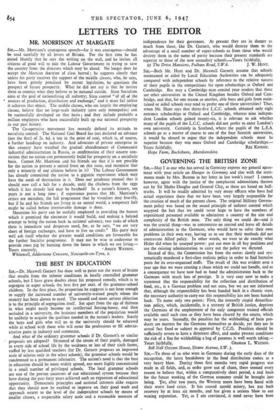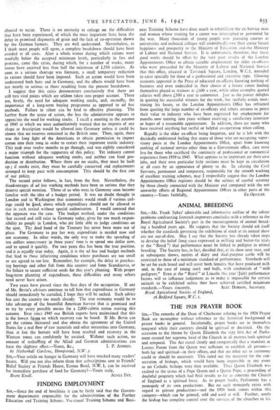SIR,—To those of us who were in Germany during the
early days of the occupation, the latest breakdown in the food distribution comes as a very heavy blow. During those first months very rapid progress was made in all fields, and, as order grew out of chaos, there seemed every reason to believe that, within a comparatively short period, a real basis for the future working of the German economy could be brought into being. Yet, after two years, the Western zones have been faced with their worst food crisis. It has caused untold misery, has put back recovery by at least six months, and has given a serious blow to our waning reputation. Yet, as I am convinced, it need never have been allowed to occur. There is no necessity to enlarge on the difficulties that have been experienced, of which the most important have been the delay in promised shipments of grain and the lack of co-operation shown by the German-farmers. They are well understood. Nevertheless, as I think most people will agree, a complete breakdown should have been avoided at all costs. After a whole winter during which rations were woefully below the accepted minimum levels, particularly in fats and proteins, came this crisis, during which, for a number of weeks, many towns have received less than half the minimum of 1,550 calories. As soon as a serious shortage was foreseen, a small temporary reduction in rations should have been imposed. Such an action would have been understood both here and in Germany, and the effects would have been not nearly so serious as those resulting from the present breakdown.
I suggest that this crisis demonstrates conclusively that there are still two vital points which are seldom taken into proper account. These are, firstly, the need for adequate working stocks, and, secondly, the importance of a long-term buying programme as opposed to ad hoc methods. Failure in either can be fatal to effective planning. The further from the scene of action, the less the administrator appears to appreciate the need for working stocks. I recall a meeting in the autumn of 1945 at which we were authoritatively warned that no imports of any shape or description would be allowed into Germany unless it could be shown that no reserves remained in the British zone. Then, again, there was the Long fight of the Americans to obtain permission to import cotton into their zone in order to restart their important textile industry. This took over twelve months to go through, and was ,rightly considered a major triumph for the supporters of this policy. Yet industry cannot function without adequate working stocks, and neither can food pro- duction or distribution. Where there are no stocks, they must be built up ; if stocks exist, they must be carefully conserved and replacements arranged to keep pace with consumption. This should be the first aim of our policy.
The second point follows, in fact, from the first. Nevertheless, the disadvantages of ad hoc working methods have been so serious that they deserve special mention. Those of us who were in Germany soon became familiar with the idea of a budget period. It was no doubt thought in London and in Washington that economies would result if various ceil- ings could be toted, above which expenditure should not be allowed to rise in each period without special authorisation. I would contend that the opposite was the case. The budget method, under the conditions that existed and still exist in Germany today, gives far too much respon- • sibility to people in London, who ire little able to judge conditions on the spot. The dead hand of the Treasury has never been more out of place. For Germany to pay her way, expenditure is needed now and not economy. In other words, the only way to make the spending of ten dollars unnecessary in three years' time is to spend one dollar now, and to spend it quickly. For two years this has been the true position, and it is equally true today. Again, it is the ad hoc and budget methods that lead to those infuriating conditions where purchases are too small or are agreed to too late. Remember, for example, the delay in purchas- ing herrings and other fish from this country and from Scandinavia, or the failure to secure sufficient seeds for this year's planting. With proper long-term planning of expenditure, these difficulties and many others need never have arisen.
Two years have passed since the first days of the occupation. If any of Mr. Bevin's advisers continue to tell him that expenditure in Germany should immediately be curtailed, I hope they will be sacked. Such advice has cost the country too much already. The true economy would be to take advantage of the bountiful American harvest that is promised and to try by every possible means for a 2,000-calorie ration starting this autumn. Ever since .1945 our British experts have maintained that this is the lowest figgt on which recovery can be based. If Mr. Sevin can get the rations increased and also obtain the agreement of the United States for a real flow of raw Materials and other necessities into Germany, then at last the bottom will have been reached and recovery in the Western zones can confidently be awaited. Without such action, no amount of reshuffling of the Allied and German administrations can



































 Previous page
Previous page